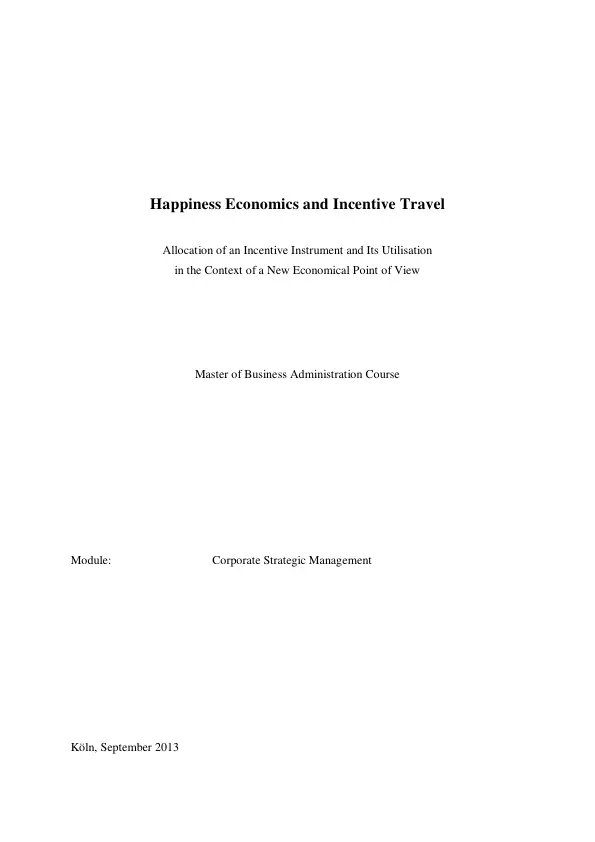Happiness Economics is a new point of view on economic utility. Profit is no longer in the sole focus of business activity. It is accomplished by a behavioural approach considering individual happiness. Using corporate incentive systems corporations are able to participate in this concept for their own benefit and the benefit of their employees. As a special incentive measure, incentive travel has the potential to affect employees`productivity and individual happiness with tangible as well as intangible values.
Inhaltsverzeichnis (Table of Contents)
- Executive Summary
- Introduction
- Problem Definition
- Objectives
- Methodology
- Happiness, Economics and Work - Happiness Economics
- Incentive Systems and Allocation of Incentive Travel
- Incentive Travel
- Concept of Incentive Travel
- Incentive Travel in Practice
- From Special to Global – Why Incentive Travel is Important for Happiness Economics
- Conclusion
Zielsetzung und Themenschwerpunkte (Objectives and Key Themes)
This study explores the intersection of happiness economics and corporate incentive systems, specifically focusing on the potential of incentive travel as a tool to boost employee productivity and well-being. The research aims to understand how this innovative approach can benefit both companies and their employees.- The concept of happiness economics and its implications for business.
- The role of incentive systems in enhancing employee motivation and productivity.
- The unique characteristics and potential benefits of incentive travel programs.
- The impact of incentive travel on employee happiness and overall well-being.
- The strategic implications of integrating incentive travel within a company's overall strategy.
Zusammenfassung der Kapitel (Chapter Summaries)
- Introduction: This chapter introduces the research topic, outlining the problem definition, objectives, and methodology employed in the study. It sets the stage for exploring the connection between happiness economics and incentive travel.
- Happiness, Economics and Work - Happiness Economics: This chapter delves into the emerging field of happiness economics, exploring its theoretical underpinnings and practical applications. It examines how traditional economic models are being challenged by a new focus on individual well-being and happiness.
- Incentive Systems and Allocation of Incentive Travel: This chapter analyzes the role of incentive systems in motivating and rewarding employees. It explores the various types of incentive programs and examines how incentive travel specifically can be implemented and utilized to achieve desired outcomes.
- Incentive Travel: This chapter provides an in-depth look at the concept of incentive travel, examining its historical development, practical application, and growing importance within the context of happiness economics. It explores the benefits of incentive travel for both companies and employees, emphasizing its potential to drive productivity and enhance well-being.
Schlüsselwörter (Keywords)
This research examines the application of happiness economics, specifically focusing on incentive travel and its potential impact on employee well-being and productivity. It explores the intersection of economic models, individual happiness, and corporate incentive systems, utilizing terms like corporate social responsibility, Gross Domestic Product, incentive travel, and Principal – Agent – Theory.Frequently Asked Questions
What is Happiness Economics?
Happiness Economics is a behavioral approach to economic utility that shifts the focus from pure profit to individual well-being and happiness as a measure of success.
How does incentive travel benefit a corporation?
Incentive travel can boost employee productivity, increase motivation, and enhance individual happiness, providing both tangible and intangible value to the organization.
What is the role of corporate incentive systems?
Incentive systems are designed to participate in the concepts of happiness economics by rewarding employees in ways that align their personal satisfaction with corporate goals.
What are the key themes of this study?
The study focuses on happiness economics, the impact of incentive travel on well-being, employee productivity, and the strategic integration of incentives in corporate strategy.
Which economic theories are mentioned in the research?
The research utilizes concepts such as Corporate Social Responsibility (CSR), Gross Domestic Product (GDP), and the Principal–Agent Theory.
- Citar trabajo
- Dipl. Päd. Thilo Ketschau (Autor), 2013, Happiness Economics and Incentive Travel, Múnich, GRIN Verlag, https://www.grin.com/document/233160



